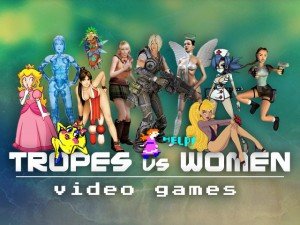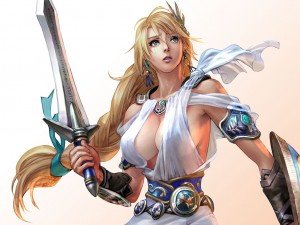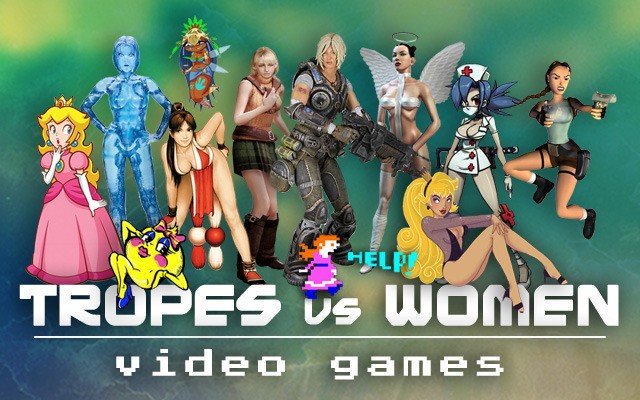“Please keep in mind that it’s both possible, and even necessary, to simultaneously enjoy a piece of media while also being critical of its more problematic or pernicious aspects.”
These are the words with which Anita Sarkeesian begins her videos exploring the use of disempowering tropes being used against women in video games. Put more simply, it is a an exploration of sexism in games, or a feminist critique of games. Sarkeesian has received an enormous amount of attention for this project, which began on Kickstarter last year and has now released its second video, which further explores the “Damsel in Distress” trope as it appears in video games.
[gn_media url="http://www.youtube.com/watch?v=toa_vH6xGqs" width="600" height="400"]Whenever discussing Sarkeesian’s work, or any critical look at video games (or any medium), it’s crucial to remember the words at the top of this article. She has received an astonishing amount of vitriol for this project, and unfortunately, any potentially legitimate criticisms were quickly drowned under a deluge of violence and misogyny. A common complaint about her new videos is that they don’t allow comments, but  over the past year the general commentariat has proven themselves incapable of expressing themselves rationally or pleasantly on the subject. And make no mistake; while the negative comments may be because of the subject matter, the incredibly violent pitch of much of the material is because Sarkeesian is a woman. Follow this link to learn more, including the shining example of humanity who decided to make a game in which the player punches Sarkeesian, betraying a complete lack of self-awareness while simultaneously lending credence to this fundamental theory of the internet. Sweet, horrible irony.
over the past year the general commentariat has proven themselves incapable of expressing themselves rationally or pleasantly on the subject. And make no mistake; while the negative comments may be because of the subject matter, the incredibly violent pitch of much of the material is because Sarkeesian is a woman. Follow this link to learn more, including the shining example of humanity who decided to make a game in which the player punches Sarkeesian, betraying a complete lack of self-awareness while simultaneously lending credence to this fundamental theory of the internet. Sweet, horrible irony.
Unfortunately, for a relatively diverse and international group of people who spend their spare time leading armies, conquering civilizations, destroying gods, and chainsawing aliens in half, gamers come across in this debate as being thin skinned.
Here are the facts:
 1. Feminism is nothing more than believing that women and men should be treated equally, and working towards this goal. It is not anything else, including a sham, a word which should have the suffix ‘nazi’ attached to it, an outdated fad which has run its course, or a vast female conspiracy to reduce men to snivelling peons.
1. Feminism is nothing more than believing that women and men should be treated equally, and working towards this goal. It is not anything else, including a sham, a word which should have the suffix ‘nazi’ attached to it, an outdated fad which has run its course, or a vast female conspiracy to reduce men to snivelling peons.
2. These videos, and feminist critique in general, are not an attack on the specific game or on the medium as a whole. On the contrary, the fact that video games are attracting critical attention is a  marker of their increasing legitimacy as an art form. Prepare for an increase in this sort of material, as well as critical approaches to video games from racial, gender, and sexuality perspectives. If you are ever worried that this is someone telling you that you shouldn’t like a game because it is being critiqued, please refer back to the first paragraph.
marker of their increasing legitimacy as an art form. Prepare for an increase in this sort of material, as well as critical approaches to video games from racial, gender, and sexuality perspectives. If you are ever worried that this is someone telling you that you shouldn’t like a game because it is being critiqued, please refer back to the first paragraph.
3. The tropes Sarkeesian presents in these videos are unquestionably extant. The Damsel in Distress and Woman in Fridge cliches are inarguably common across video games, and their presence is worth discussing, as are any other cliches where women are victimised, objectified, or otherwise treated as second-class citizens. Here are some things that are irrelevant to the presence of sexist tropes:
A. The woman is portrayed as strong and independent: Catwoman in Batman: Arkham City is clever and kicks ass, but that doesn’t change the fact that her character model and costume hugely emphasise her as an object for men to look at.
 B. There are games with strong female protagonists. Faith and Commander Shepard are great, but that doesn’t get rid of sexism in gaming.
B. There are games with strong female protagonists. Faith and Commander Shepard are great, but that doesn’t get rid of sexism in gaming.
C. You are or know a woman who doesn’t have a problem with the way women are represented in video games. You don’t have to be a woman to see these tropes, nor does a woman have the authority to make them unimportant.
D. You like the game. Please refer to the first paragraph.
4. Sexism in gaming affects you, even if you only care about gameplay and don’t want to ‘politicise’ or ‘overcomplicate’ the issue. As Sarkeesian also notes, games don’t exist in a vacuum, and the reason one finds sexism in games is because they are part of our cultural fabric, which bears the threads of sexism. Even if we ignore that some games have sexist tropes directly integrated into gameplay (Ico, Deadlight), sexist tropes in gaming still reinforce our worldview and leave us fundamentally unchallenged and bored. This is because tropes are usually the product of laziness on the part of the developers and writers, not some malicious desire to subjugate women. It’s just easier to do what has been done before than to try something new, and it so happens that ‘what has been done before’ and ‘sexist cliches’ have a great deal of crossover. A lot of this is probably due to gaming’s relative youth. But gaming is no longer a child; it has entered the awkward adolescent phase and as a result it is getting much more critical attention, like film before it.
So to recap: Sexist tropes are common and make for critical fodder, though they don’t have to stop you from enjoying the game. However, it is good to be conscious of them so that you can understand more about the way people think and the world works, and because it’s interesting and part of being a good feminist (which isn’t a dirty word, check point #1).
What are your experiences and thoughts on the subject? Would you like to tell me how wrong I am? Leave a comment!


